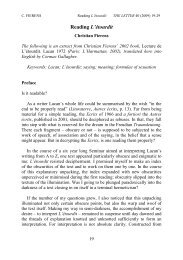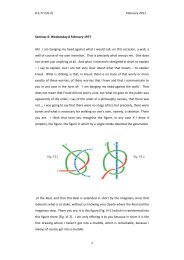someone for whom I have great esteem, he is J.–C. Milner. It is No 30, whichappeared <strong>in</strong> May 1976. It is called Réflexions sur la réference. Someth<strong>in</strong>g that,after read<strong>in</strong>g this article, is an object of <strong>in</strong>terrogation for me is the follow<strong>in</strong>g; it isthe role that he gives to the anaphore. He notices that grammar plays a certa<strong>in</strong>role and that specifically the sentence that is not so simple: ‘I saw 10 lions andyou, he says, you saw 15 of them (tu en a vu 15)’, the anaphore <strong>in</strong>volves the useof this ‘en’. It very precisely highlights th<strong>in</strong>gs by say<strong>in</strong>g that the ‘en’ does notconcern the lions, it concerns the 10. I would prefer that he should not say ‘tu ena vu 15’; I would prefer him to say ‘tu en a vu plus’. Because, <strong>in</strong> truth, the tu <strong>in</strong>question has not counted these 15. But it is certa<strong>in</strong> that <strong>in</strong> the dist<strong>in</strong>ct sentence: ‘Icaptured 10 lions and you, tu en a capturé 15’, the reference is no longer to the 10but to the lions. It is, I believe, quite gripp<strong>in</strong>g that <strong>in</strong> what I call the structure ofthe unconscious, grammar must be elim<strong>in</strong>ated. Logic must not be elim<strong>in</strong>ated, butgrammar must be elim<strong>in</strong>ated. In French there is too much grammar. In Germanthere is still more. In English, there is a different one that is <strong>in</strong> a way implicit.Grammar must be implicit to have its proper weight.I would like to <strong>in</strong>dicate to you someth<strong>in</strong>g which is from a time when French didnot have such a burden of grammar. I would like to po<strong>in</strong>t you towards someth<strong>in</strong>gcalled Les bigarrures du seigneur des Accords (‘The variegations of the lord ofconcords’). He lived right at the end of the 16 th century. It is gripp<strong>in</strong>g because heseems to be all the time play<strong>in</strong>g on the unconscious, which is all the same curious,given that he had no k<strong>in</strong>d of idea of it, even less than Freud, but it is all the sameon it that he plays. How manage to grasp, to say, this sort of flux that usage is?And how state precisely the way <strong>in</strong> which, <strong>in</strong> this flux, the unconscious, which isalways <strong>in</strong>dividual, can be specified?There is someth<strong>in</strong>g strik<strong>in</strong>g, which is that there are not three dimensions <strong>in</strong>language. Language is always flattened out. And that <strong>in</strong>deed is why my twistedbus<strong>in</strong>ess of the Imag<strong>in</strong>ary, the Symbolic and the Real, with the fact that theSymbolic is what goes above what is above and which passes beneath what isbeneath, this <strong>in</strong>deed is what gives it its value. The value is that it is flattened out.44
It is flattened out, and <strong>in</strong> a way that you know, because I repeated, resifted it, youknow the value of the function, namely, that the effect this has is that if one ofthe 3 dissolves, the 2 others are freed. This is what I described, at one time, bythe term knot for someth<strong>in</strong>g that is not a knot, but effectively a cha<strong>in</strong>. This cha<strong>in</strong>all the same, it is strik<strong>in</strong>g that it can be flattened out.And I would say that – it is a reflection, like that, which was <strong>in</strong>spired <strong>in</strong> me by thefact that as regards the Real, people want to identify it to matter (la matière) – Iwould rather propose to write it like this ‘l’âme à tiers’ 7 (third party soul?). Itwould be, like that, a more serious way of referr<strong>in</strong>g oneself to this someth<strong>in</strong>g thatwe have to deal with, and it is not for noth<strong>in</strong>g that it is homogenous to the twoothers; that someone named Charles - Sanders as he was called, as you know, Ialready wrote this name often, many, many times, - that this Peirce was reallystruck by the fact that language does not properly speak<strong>in</strong>g express relation, that<strong>in</strong>deed is someth<strong>in</strong>g which is strik<strong>in</strong>g; that language does not permit a notationlike x hav<strong>in</strong>g a certa<strong>in</strong> type of relation with y, and no other; this <strong>in</strong>deed is whatauthorises me, s<strong>in</strong>ce Peirce himself articulates that for this there would need tobe a ternary logic, and not the one we use, a b<strong>in</strong>ary logic, this <strong>in</strong>deed is whatauthorises me to speak about l’âme à tiers’ as someth<strong>in</strong>g which necessitates acerta<strong>in</strong> type of logical relationships.Yes. Well then, all the same, I am go<strong>in</strong>g <strong>in</strong> effect to come to this Philosophie eneffet, a collection published by Aubier-Flammarion, to say what scared me a little7 Pun on la matière.45
- Page 1: Seminar 1: Wednesday 16 November 19
- Page 5 and 6: after all noticed that to consist m
- Page 7 and 8: It would be enough for you to take
- Page 9 and 10: There had therefore been a turning
- Page 11: Supposing that we have a torus in a
- Page 15 and 16: topology encourages us to do so. Th
- Page 17 and 18: and me, and I who, in short, by din
- Page 19 and 20: we cut it in two, the front and the
- Page 21 and 22: is itself a hole and in a certain w
- Page 23 and 24: Everyone knows that this is how thi
- Page 25 and 26: Seminar 3: Wednesday 21 December 19
- Page 27 and 28: proceed to this double cut, a doubl
- Page 29 and 30: The inside and the outside in this
- Page 31 and 32: egards the structure of the body, o
- Page 33 and 34: inspired by it and its inspiration,
- Page 35 and 36: music on you, is that it has this p
- Page 37 and 38: from the beloved to the lover. What
- Page 39 and 40: that the little o-object is not uni
- Page 41 and 42: Seminar 4: Wednesday 11 January 197
- Page 43: short I called the discourses; the
- Page 47 and 48: astonishes me still more, is not th
- Page 49 and 50: Seminar 5: Wednesday 18 January 197
- Page 51 and 52: see it here, namely, something that
- Page 53 and 54: namely, that everything that concer
- Page 55 and 56: Let’s see. Let us try to see here
- Page 57 and 58: - X: You can’t hear me because pr
- Page 59 and 60: Seminar 6: Wednesday 8 February 197
- Page 61 and 62: its relationship to the body that w
- Page 63 and 64: that in the position B1, would be t
- Page 65 and 66: is in the position of maintaining t
- Page 67 and 68: Effectively the problem of primary
- Page 69 and 70: which I will return later, what is
- Page 71 and 72: the object of desire is not unknown
- Page 73 and 74: that he tells the truth. You see th
- Page 75 and 76: look of the Real, there is not, for
- Page 77 and 78: accentuated by him is the search fo
- Page 79 and 80: What is happening, is it not, the d
- Page 81: grounded and articulatable way, and
- Page 84 and 85: eason is said to be purloined, whil
- Page 86 and 87: Borromean knot with that of the Ima
- Page 88 and 89: Alain Didier Weill, for his part, i
- Page 90 and 91: Seminar 8: Wednesday 8 March 1977Wh
- Page 92 and 93: shouldn’t tell you, at 7.15 at Ju
- Page 94 and 95:
means that the tongue fails, that,
- Page 96 and 97:
of his time as a formidable cleric
- Page 98 and 99:
It is very difficult not to waver o
- Page 100 and 101:
I remind you that the place of semb
- Page 102 and 103:
this term in the feminine, since th
- Page 104 and 105:
which coincides with my experience,
- Page 106 and 107:
and to put that for you in black an
- Page 108 and 109:
see, does not see too great an inco
- Page 110 and 111:
that exists, he says what he believ
- Page 112 and 113:
In short, one must all the same rai
- Page 114 and 115:
particular besides, neurotic, a sex
- Page 116 and 117:
functioning as something else. And
- Page 118 and 119:
mean to deny? What can one deny? Th
- Page 120 and 121:
slipping from word to word, and thi
- Page 122 and 123:
Seminar 12: 17 May 1977People in th
- Page 124 and 125:
y writing. And writing only produce
- Page 126 and 127:
not pinpointed it? He calls this a














